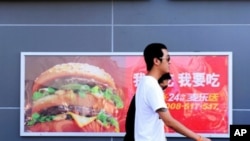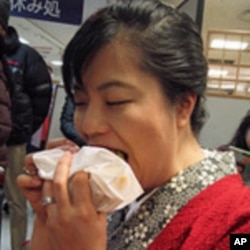Despite the widespread problem of hunger in Asia, growing economies have lifted many out of poverty. And as incomes expand, so too, are diets. Some health officials say this is causing new problems for Asia's growing middle class.
So, the next time you step into a fast food joint, you may want to choose a regular cheeseburger instead of a Big Mac. Why not super-size your burger? Because there is a risk of a jaw injury. Dentists in Southeast Asia say they are seeing an increase in the number of jaw disorders and they are blaming stress and the growing popularity of big-sized, Western-style fast food.
Specialized dentist Ansgar Cheng runs a clinic in Singapore. In fact, he is a prothodontist. This reporter asked Cheng what exactly that means.
"We are specialists in reconstructions and the biomechanics of jaw joints," explains Cheng, whose training makes him an expert in temporomandibular joint disorder, also known as TMJ. The painful condition occurs when the joint that connects your jaw to your skull becomes inflamed, making chewing painful.
Over the past few years, Cheng says he has seen a considerable increase in the number of TMJ problems, adding that a lot of it can be blamed on people eating super-sized burgers.
"On average most Asians are petite-sized people so, in general, we could say our jaw openings are somewhat smaller than Westerners," he notes.
Cheng explains that Asians trying to fit a Big Mac into their mouths could over-stretch their chewing muscles, damage mouth cartilage or even dislocate their jaw.
Cheng, who received his training in the United States and Canada, says most people are unaware of TMJ problems, which confuses people when the symptoms arise.
"Like most joints we have two bones riding against each other," he says. "In between the bones we have cartilage, but what happens with TMJ is there is a thin piece of floating cartilage in between the two bones. When we overwork the jaw joints the piece of cartilage gets worn down and we start to experience clicking or pain in the jaw joints."
The injury itself is not necessarily serious at first. But the dentist says that because of the unique conditions in the mouth, and our need to eat food everyday, the problem can become serious.
"If you have a cut on your skin, it takes seven days to heal, no big deal. You break a piece of bone it takes seven to eight weeks to heal. But cartilage is notoriously hard to get healed," Cheng points out. "It takes up to four months and that's the period that causes people problems. What ever noise happens to be in jaw joints it magnifies a lot and you hear that clicking sound."
I suppose we could go on and on about the danger of eating over-sized burgers, but wouldn't it just make a lot of sense to simply cut our food in half so we do not overdue it with our jaws?
Cheng agrees. "That's exactly the case. Instead of getting a giant burger, just go to the same burger joint and ask for a regular burger."
Although it is a rather odd idea that big hamburgers are causing health problems among the small-mouthed people of the world, dentists warn that TMJ is not something to take lightly.
Without treatment, the situation could get worse and become a chronic problem. So remember to cut your hamburgers -- and do not ignore your dentist.










